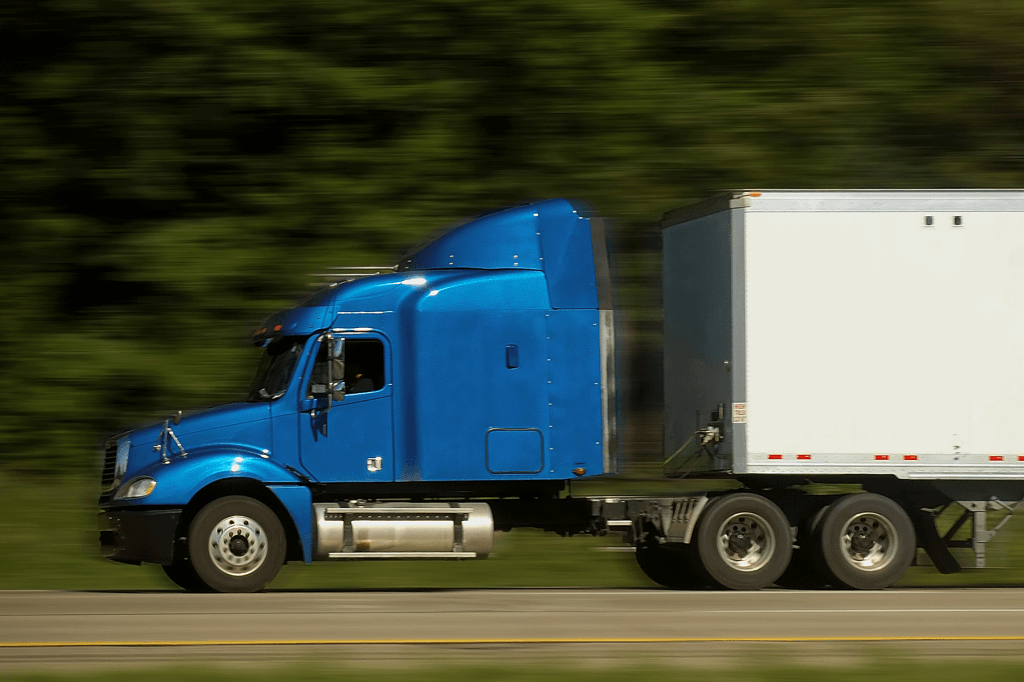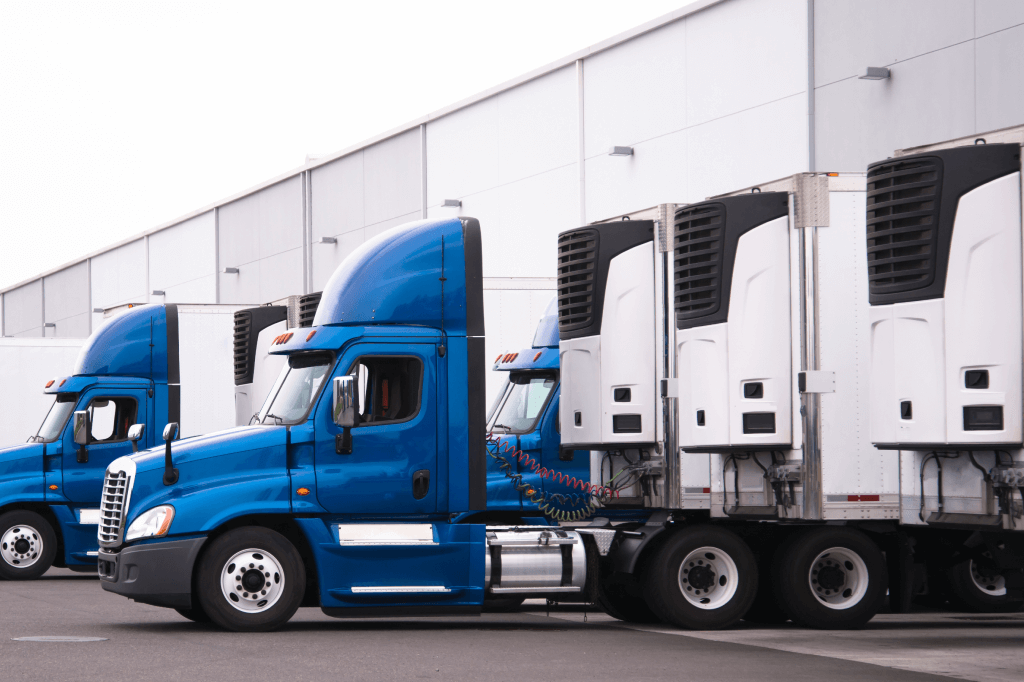Dry Van vs. Reefer: Which is Best?

The question of whether a dry van or a reefer is best depends a lot on the lanes you work in and the type of cargo you carry. There are fewer than a quarter as many reefers on the road in the United States compared to dry vans, specifically, 400,000 reefers and 1.7 million dry vans. That’s a lot of trailers on the road.
But why so many more dry vans vs reefer trucks? Here’s what you need to know and how to decide whether a reefer or a dry van is best for your trucking company.
There’s a better way to find loads.
Demo the Truckstop Load Board and see how easy it is to find the right loads fast.
Dry van or reefer: Which is right for you?
Before you start transporting loads, you need to understand the different shipping methods, trailer types, and which work best for different cargo.
- Dry van. The most common type of trailer can haul a variety of dry freight products, both short and long distances.
- Heavy haul. This type of trailer is suited for hefty and unusual loads.
- Flatbed. Often used for hauling equipment, crates, and miscellaneous materials, this type of trailer is good for loads that wouldn’t fit efficiently into a dry van.
- Reefer or refrigerated. Refrigerated trailers haul perishables that require temperature control during transport.
There are other trailer types, each made to carry certain cargo types and some highly specialized. It’s important to know which equipment is best for which loads and the pros and cons of each.
This guide will focus on comparing reefer trailers to dry vans and loads. Size is usually where the similarities end.
What is a dry van?
A dry van is the most common type of trailer in the trucking industry because it’s very versatile. It’s a contained box, which is why it’s often called a box trailer. When uncoupled or unhooked from the cab, it has legs the trailer stands on. Finding loads for dry vans on load boards is relatively easy because of the different cargo types they can carry.
Dry vans usually haul non-perishable and dry items: electronics, appliances, non-perishable food, and other things commonly hauled on pallets. Essentially anything dry and non-perishable that will fit inside can be hauled by a dry van trailer.
Most dry vans are between 48′ and 53′ long, 13′ 6″ high, and 102″ wide. Some have roll-up doors, loading ramps for connecting with various loading docks, aerodynamic skirts, and an e-track system to improve fuel mileage.

Advantages of dry vans
- Versatility. They can carry a variety of cargo types for short or long-haul runs.
- Security. Dry vans do a great job of protecting cargo because they’re fully enclosed from weather and easy to lock and secure.
- Convenience. You can use the drop and hook load method (drop one trailer, pick up another) without having to wait for the trailer to be unloaded. This keeps your truck moving and saves you time on multiple runs.
- Affordability. Dry van shipping is more affordable than many other hauling methods.
Disadvantages of dry vans
The primary challenge of dry vans is the wood floor. Wood is easily damaged by moisture and condensation, meaning more frequent repairs. This moisture can come from the freight itself or open doors, especially when unloading or loading during bad weather.
How does using a dry van trailer impact shipping costs?
Dry vans are incredibly versatile and can ship all sorts of freight. Because there are so many more dry vans vs. reefer trucks, it’s more affordable for shippers than using reefer trucks. Hauling dry freight does not require temperature control, which uses more energy and costs more.
The cost of running dry vans will vary depending on fluctuations in pricing in your shipping lanes and demand. You will generally earn less for dry van loads, so you’ll want to manage your margins carefully.
What are reefer trailers?
A reefer trailer or refrigerated trailer is a trailer that can be temperature controlled using a kind of portable HVAC system. Reefers often haul several LTL shipments in one load to more than one location. Anything perishable or that requires a specific stable temperature can be moved in a reefer unit.
You can find reefer loads on a load board that caters to shippers with perishable freight. Examples: frozen goods, perishable foods, chemicals, and even pharmaceuticals.

The reefer truck has several parts, including an evaporator, condenser, compressor, and the reefer engine attached to the trailer that runs the HVAC system. It’s also much more insulated than in dry van trucking, but the dimensions are similar at 48′ to 55′ long, 13′ 6″ high, and 102″ wide. The difference is the interior cargo space, which is usually smaller because of insulation.
Floors are usually metal because it handles temperature changes and moisture much better than wood.
Advantages of reefer trailers
- Demand. There will always be a need to transport perishable goods. Besides food items, there are also medicine and cosmetic items that need tight temperature control, so it’s usually easy to find reefer loads.
- Versatility. You don’t have to carry only refrigerated loads. You can also carry dry goods and other temperature-sensitive loads with reefer trucks.
- Security. Reefer trailers are easy to secure and excellent at protecting freight from weather and theft.
Disadvantages or reefer trailers
- Reefer trailers come with extra responsibilities. You should clean the trailer thoroughly between loads and control and monitor the cooling equipment and trailer temperature.
- The constantly running motor can be noisy.
- There’s usually not a drop and hook option available. Loading and unloading times can be longer at docks.
- There is more equipment to maintain, and malfunctions can mean losing the load if not caught in time.
- Trailers must be pre-cooled before loading cargo, which adds to preparation time.
- They are expensive. The additional motor and equipment mean more fuel consumption.
Reefer loads can be very lucrative, especially sensitive loads. Some reefer trailers have sophisticated features, like zones that let you set different temperatures in different parts of the trailer. These are often in high demand.
How does using a reefer impact shipping costs?
Reefer will cost shippers more, which means you can charge more for refrigerated truck loads. There are also additional costs for running reefer fleets. Cooling units require energy, which means more fuel. Maintenance and cleaning, especially when hauling food-grade products, can be more expensive. There are also more moving parts for temperature control, adding to repair costs.
Drivers must monitor temperatures and ensure freight stays at the desired temperature. If something goes wrong, they must act quickly. There’s a premium for that. There may also be additional costs due to time-sensitive delivery windows. Still, operating reefer trucks provide other opportunities for carriers. They can also haul dry loads, which provides more options for making money.
Use load boards to find loads and connect with shippers and brokers.
No matter what you’re driving, whether it’s a dry van, flatbed trailer, or reefer, the best thing you can do is use load boards to avoid deadhead runs. Empty trailers still cost you money for fuel, time, and wear and tear on your truck. A loaded truck is a profitable one. Connecting with reliable brokers and verified loads is a great way to keep your vehicle always working for you.
Sign up for the Truckstop Load Board today to get started with your trucking business.

Find out how our platform gives you the visibility you need to get more done.
Get helpful content delivered to your inbox.
Schedule a demo.
Find out how our platform gives you the visibility you need to get more done.






